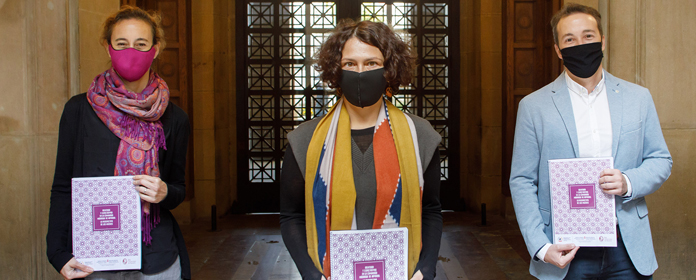The Government of Navarra and the Institute for Culture and Society present a report on the Moroccan community in Navarra from the perspective of women.
Literacy, professional training and work experience are the main challenges identified for their access to the work market and integration into society.

PHOTO: Government of Navarra
The Government of Navarra, through the Observatory of Social Reality and the department of Migratory Policies and Justice, and the Institute for Culture and Society (ICS) of the University of Navarra have conducted a report to obtain a deeper knowledge on the communities of Moroccan origin in Navarra through the perspective of women. The field work consisted of three focus groups in Tudela, Fitero and Cintruénigo and in-depth interviews with 42 women in these localities and others in Castejón.
The work, 'Identity and expectations in the Moroccan community of Navarra: the perspective of women', was presented on Wednesday at the framework of a virtual workshop . Patricia Ruiz de Irizar, Director General of Migration Policies of the Regional Government, opened the event; Sarali Gintsburg, researcher at the group 'Public discourseShe presented the main conclusions of the project that she has directed; and Jan Jaap de Ruiter, professor of programs of study Cultural at the University of Tilburg, spoke about the experience of the Netherlands with the Moroccan diaspora.
Among the most relevant problems that have been detected are the following. Firstly, a considerable issue of Moroccan immigrant women have a very basic or no literacy level in both Arabic and Spanish. Likewise, most of them do not have a professional training and a significant number have never worked outside the home.
Proposals: social roles and Education of adults and minors"According to integration experts, the fundamental keys are mastery of the local language and access to the labor market," says Sarali Gintsburg, principal investigator of report, who adds that these aspects are conditioned by the level educational of immigrants and their possibilities of training.
"The lifestyle adopted constitutes a vicious circle that is difficult to overcome. It is difficult for members of this community to develop a professional or academic degree program or to fully integrate into Navarre society without financial aid", he points out.
For their part, the women of Moroccan origin who participated in the study indicated the following needs: Spanish classes, professional courses at training , introduction of Arabic and notions of the Islamic religion in school curricula, and the creation of women's associations. They indicated that they would like to enter professions such as tailoring/sewing, elderly care, cooking and baking.
The authors of report propose several measures to improve the employment status of this community. First, they suggest creating new social roles and assigning them to women through social services and other governmental organizations, as well as NGOs. They also propose designing programs for staff at training in fields such as cleaning public and office spaces, landscaping jobs, caring for the elderly or sick, etc.
They also recommend implementing strategies and policies that guarantee economic aid in exchange for offering services to society, as well as promoting attendance to professional courses, programs on the culture and values of the place of coexistence. Another aspect is the Education for adults, especially in language Spanish and training professional, and Education for minors.
Government projects on language learning and women empowermentThe data will be made available to the General Administration of Migration Policies to develop lines of socio-political action and thus achieve greater integration of these communities in the life of the cities and towns in which they live, as well as in Navarre society in general.
In this sense, the general director of Migration Policies, Patricia Ruiz de Irízar, emphasizes that the results of the study "ratify some of the bets we have been making, such as projects related to the learning of Spanish of adult migrants, which will be launched soon".
Regarding the specific role of women, Ruiz de Irízar emphasizes that "Moroccans are the protagonists of many examples of integration and intercultural coexistence, participating in many activities and joint workshops with women born in Navarra". Thus, she gives as an example "numerous initiatives in towns of the Ribera where experiences are shared, and that are model to follow for activities that we want to multiply throughout our community".
Patricia Ruiz de Irízar affirms that "giving opportunities to these women will favor their empowerment and autonomy, an aspiration that we also have and share as a Government with institutions such as the high school Navarro for Equality (INAI)". "The empowerment of women is a priority, wherever they were born," she concludes.
It should be recalled that since 2019 migrants from Morocco represent the majority of the foreign population in Navarra. On January 1 of that year there were 14,227 individuals born in that country registered in Navarra. The issue of second-generation Moroccans is unknown, although it is estimated to amount to several thousand more.




